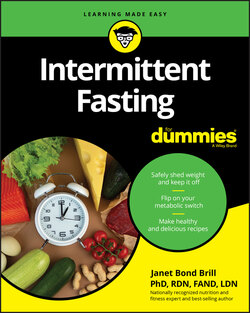Читать книгу Intermittent Fasting For Dummies - Janet Bond Brill - Страница 73
IDENTIFYING THE CAUSES OF CALORIE SURPLUS
ОглавлениеPeople become overweight from creating an extended calorie surplus. If you’ve gained weight, it may be because you’re making unhealthy food choices (like fast food) and poor behavioral habits (such as eating mindlessly in front of the TV or while driving in your car). High-calorie, low-nutrient snacks and beverages, huge portions of food, and less-active lifestyles all contribute to the obesity epidemic.
You may be someone who turns to food for emotional reasons, such as when you feel upset, anxious, sad, stressed out, or even bored. If so, try writing the answers to these questions in your journal, an exercise in self-examination that can help you identify and overcome this obstacle to achieving your healthy lifestyle goals:
Do you tend to overeat in response to emotions? If yes, what emotions are your trigger?
What seems to be the root cause?
What and where do you eat?
I also suggest you flip to Chapter 2, where I give you more journaling exercises to work on as you progress through your intermittent fasting lifestyle.
Consider the following, which are things that may lead to your calorie surplus:
Eating a poor diet and making unhealthy food choices
Eating out often and chowing down on oversized restaurant food portions
Inheriting being overweight or obese
Feeling negative emotions like stress, boredom, sadness, or anger, that may influence eating habits
Living an inactive lifestyle:Spending too time in front of a screen — watching television, playing video games, working on a computerChoosing to be more sedentary (driving rather than walking, taking the elevator instead of the stairs, and so on)Not exercising enough
